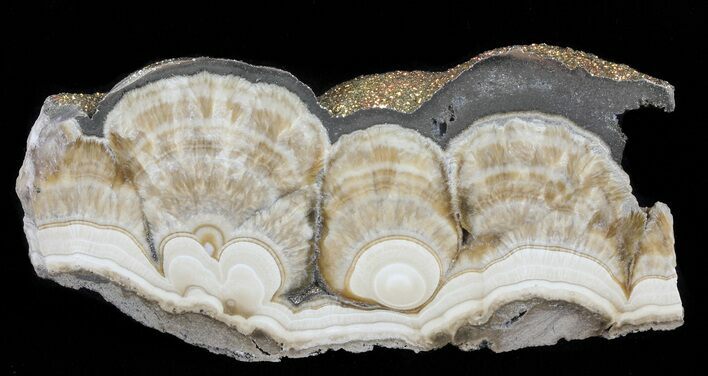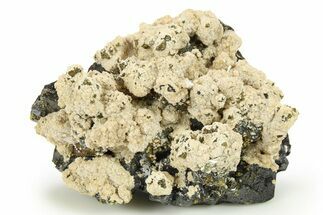This Specimen has been sold.
3.1" Baryte & Marcasite Cross Section Slice - Lubin Mine, Poland
This is a beautiful, polished baryte and marcasite slice, collected from the Lubin Mine in Poland. The baryte displays a coloration that ranges between brown, white and beige, dependent on conditions and composition of minerals present during formation. This specimen allows for a cross section view of the various layers of formation that took place. The middle layers are baryte, with an exterior layer composed of lustrous and colorful marcasite crystals.
About The Lubin Mine
Southwest Poland is home to some of the world's largest copper and silver ore mines, each also housing a variety of metallic minerals. The average depths of these mines are around 1000 meters, and together the total length of their tunnels reach over 10,000 meters. The Lubin Mine is the oldest mine in the region, known for primarily producing large amounts of important minerals such as chalcocite, bornite and chalcopyrite. Each are important copper ores.
The Lubin Mine was discovered and developed during the 1960s, and to this day is still a premier copper and silver producing mine. In 2011, a miner came across a large fault during routine excavations. After mining into the roof of this tunnel, he discovered a massive cavity that he could only reach by ladder. Once he climbed into it, the miner observed that the pocket continued another 5 meters upward, then curved into an irregular 11 meter (36 foot) tunnel tall enough to stand in in some parts.
The cavity walls were covered in kidney-shaped baryte "balls", which were all coated in a layer of colorful and sparkling marcasite crystals. The walls' arrangements ranged between convex and concave formations, including some stalactitic structures. Every inch of this cavity was covered in these shimmering baryte and marcasite mineralizations.
Shortly after discovery, this cavernous pocket was filled with concrete for structural stability purposes. Fortunately, a relatively small amount of these mineral conglomerates were able to be extracted. However, since the cavity has now been filled, the marcasite and baryte collected from it is all that is on the market.
Southwest Poland is home to some of the world's largest copper and silver ore mines, each also housing a variety of metallic minerals. The average depths of these mines are around 1000 meters, and together the total length of their tunnels reach over 10,000 meters. The Lubin Mine is the oldest mine in the region, known for primarily producing large amounts of important minerals such as chalcocite, bornite and chalcopyrite. Each are important copper ores.
The Lubin Mine was discovered and developed during the 1960s, and to this day is still a premier copper and silver producing mine. In 2011, a miner came across a large fault during routine excavations. After mining into the roof of this tunnel, he discovered a massive cavity that he could only reach by ladder. Once he climbed into it, the miner observed that the pocket continued another 5 meters upward, then curved into an irregular 11 meter (36 foot) tunnel tall enough to stand in in some parts.
The cavity walls were covered in kidney-shaped baryte "balls", which were all coated in a layer of colorful and sparkling marcasite crystals. The walls' arrangements ranged between convex and concave formations, including some stalactitic structures. Every inch of this cavity was covered in these shimmering baryte and marcasite mineralizations.
Shortly after discovery, this cavernous pocket was filled with concrete for structural stability purposes. Fortunately, a relatively small amount of these mineral conglomerates were able to be extracted. However, since the cavity has now been filled, the marcasite and baryte collected from it is all that is on the market.
SPECIES
Baryte & Marcasite
LOCATION
Lubin Mine (copper mine), Lubin, Lower Silesia, Poland.
SIZE
3.1" wide, 1.6" tall
CATEGORY
ITEM
#60411
 Reviews
Reviews














